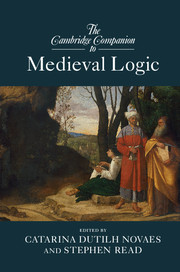Book contents
- Frontmatter
- Contents
- List of Contributors
- Introduction
- PART I PERIODS AND TRADITIONS
- 1 The Legacy of Ancient Logic in the Middle Ages
- 2 Arabic Logic up to Avicenna
- 3 Arabic Logic after Avicenna
- 4 Latin Logic up to 1200
- 5 Logic in the Latin Thirteenth Century
- 6 Logic in the Latin West in the Fourteenth Century
- 7 The Post- Medieval Period
- PART II THEMES
- Bibliography
- Index
6 - Logic in the Latin West in the Fourteenth Century
from PART I - PERIODS AND TRADITIONS
Published online by Cambridge University Press: 05 September 2016
- Frontmatter
- Contents
- List of Contributors
- Introduction
- PART I PERIODS AND TRADITIONS
- 1 The Legacy of Ancient Logic in the Middle Ages
- 2 Arabic Logic up to Avicenna
- 3 Arabic Logic after Avicenna
- 4 Latin Logic up to 1200
- 5 Logic in the Latin Thirteenth Century
- 6 Logic in the Latin West in the Fourteenth Century
- 7 The Post- Medieval Period
- PART II THEMES
- Bibliography
- Index
Summary
The main advances in logical investigations in the thirteenth century in the Latin West were concentrated at the Universities of Paris and Oxford. There were other universities and studia generalia, such as Cambridge, Erfurt and elsewhere, where logic was taught, and on which both Oxford and Paris depended for their students, and to which they despatched many of their masters after their studies in Arts. But the real originality in driving forward the logica modernorum, the real innovations in developing the theories of properties of terms, of consequence, of obligations theory and the treatment of insolubles, is found for the most part in the work of masters teaching at Paris and Oxford.
All this had changed by the end of the fourteenth century. By 1400, there were many more universities, particularly in northern Europe, starting with the German universities established at Prague, Vienna, Erfurt and Heidelberg, and in southern Europe there was a revival and extension of the study of logic in Italy and Spain. In the meantime, the Black Death, striking first from 1347 to 1349, and again in 1361 and 1369 (and repeatedly for the next 300 years or so), although reducing the population by at least one-third, had surprisingly not reduced the output of logical treatises, even if it affected their vitality. Nor had the Papal Schism (see Section 6.5) apparently affected the study of logic, but if anything served to disseminate it more broadly.
Returning to the start of the fourteenth century, all real interest in logic was arguably preserved by those working in Oxford. This is the thesis propounded by Ebbesen (1985). We are, of course, dependent for our understanding of historical developments on historical traces, in particular, what logical treatises have been preserved – and indeed, on which of those that have been preserved have been studied. Nonetheless, it does seem that interest in logic waned at Paris towards the end of the thirteenth century in the face of the rise of modism, with its fascination with grammar and the so-called “modes of signification”. Hitherto, univocation had united a term with a single signification throughout the different things for which it supposited: e.g. the signification of ‘man’ is the same though the term supposits for different classes of men in ‘Some man is running’ and ‘Socrates was a man’.
Information
- Type
- Chapter
- Information
- The Cambridge Companion to Medieval Logic , pp. 142 - 165Publisher: Cambridge University PressPrint publication year: 2016
Accessibility standard: Unknown
Why this information is here
This section outlines the accessibility features of this content - including support for screen readers, full keyboard navigation and high-contrast display options. This may not be relevant for you.Accessibility Information
- 5
- Cited by
